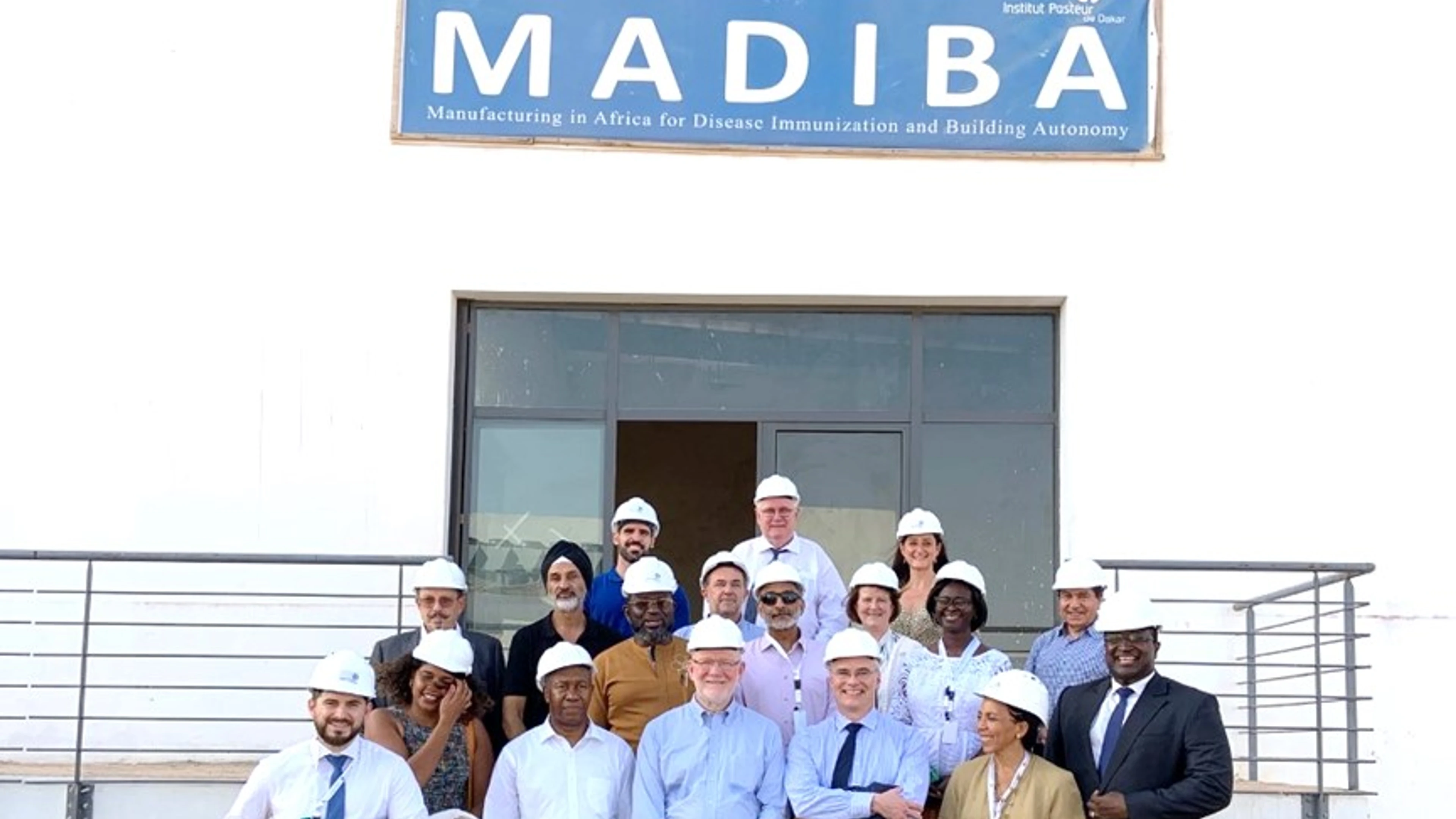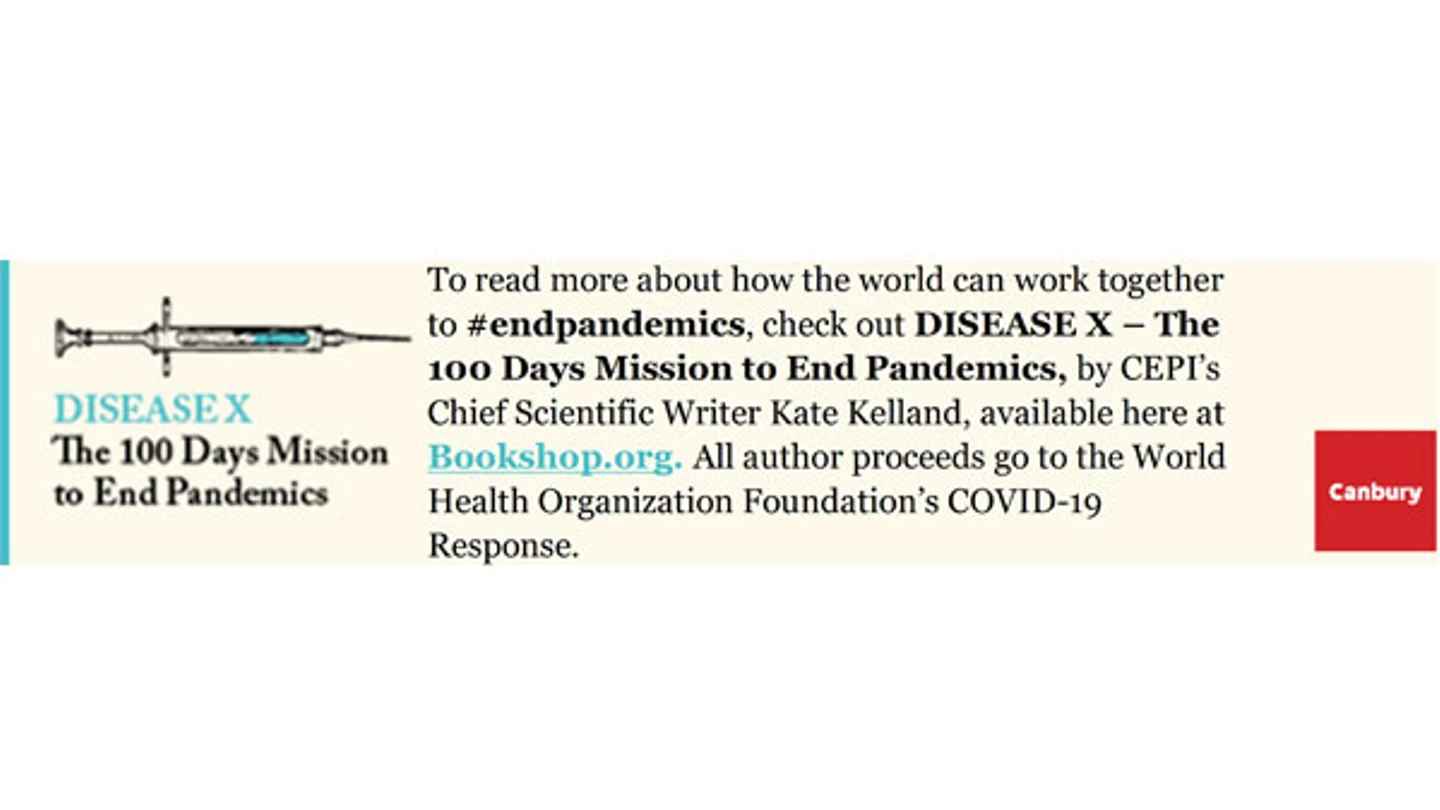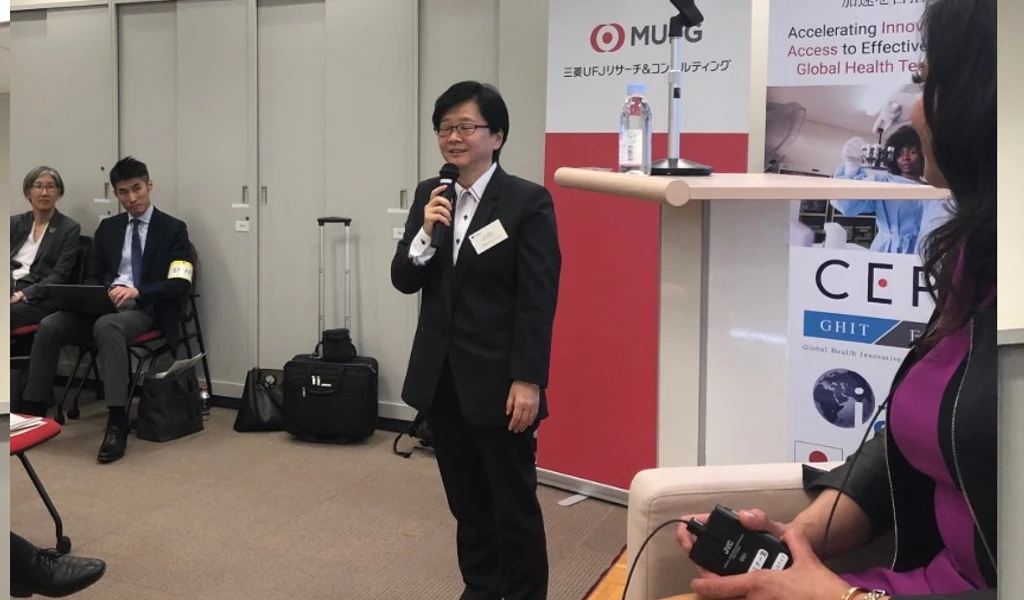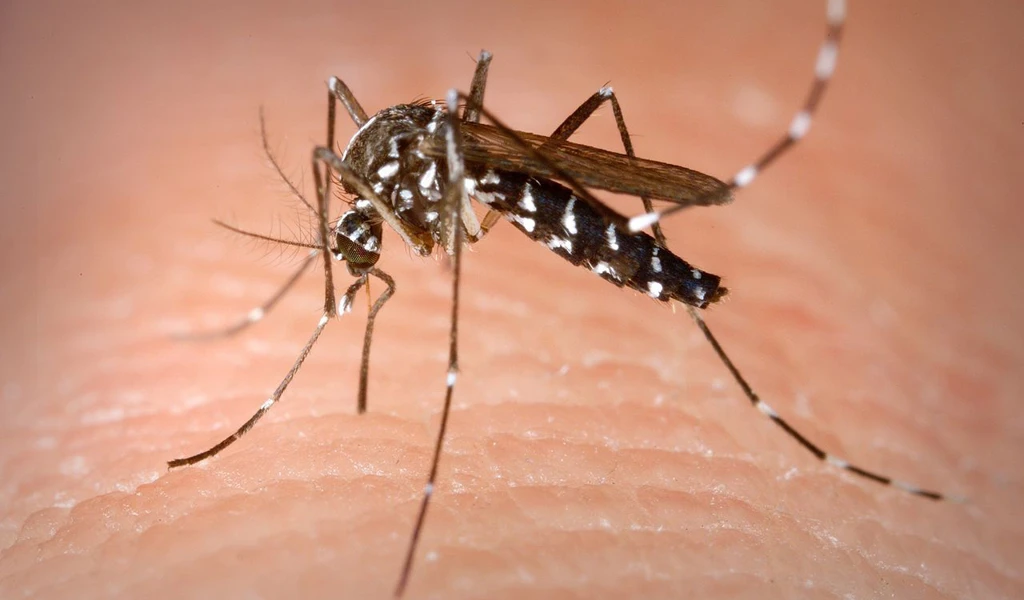CEPI and Institut Pasteur de Dakar announce 10-year partnership to boost manufacturing of affordable vaccines for the Global South

Partnership will advance equitable access to vaccines by expanding IPD's capacity to produce routine immunization vaccines across multiple technologies, and reserve capacity to rapidly supply vaccines to Global South countries during disease outbreaks.
Collaboration will see CEPI invest up to $50 million over 10 years.
IPD joins CEPI's global manufacturing network which will support agile and resilient manufacturing in the Global South - boosting and accelerating access to life-saving vaccines during future outbreaks and pandemics.
19 January 2023; OSLO, Norway and DAKAR, Sénégal: The Coalition for Epidemic Preparedness Innovations (CEPI) and the Institut Pasteur de Dakar (IPD) today announced a partnership that will advance equitable access to vaccines in Africa and contribute to the African Union's goal of increasing African manufacturers' share of vaccine supply to the continent to 60% by 2040. The collaboration will boost the manufacturing of affordable vaccines at IPD's facilities in Dakar, and reserve capacity to produce vaccines specifically for Global South countries during future outbreaks and pandemics to combat the kind of inequity that characterised the response to COVID-19.
CEPI is creating a new network of vaccine manufacturers in Global South countries to substantially increase the world's capacity and capability to produce vaccines against emerging outbreaks and pandemic threats. IPD becomes part of this network, having manufactured WHO prequalified yellow fever vaccines for 80 years, and with the ambition to become a regional manufacturing hub making vaccines in Africa, for Africa, through Project MADIBA[1]. IPD will initially receive up to US$15 million in grant funding over three years, with the option to extend the partnership's scope and funding to a total of up to US$50 million over 10 years. CEPI's investment will complement that of other major funders for MADIBA, including the European Union, European Investment Bank, the Agence Française de Développement, the Islamic Development Bank, the International Finance Corporation, the U.S. International Development Finance Corporation, the Government of Germany and the Government of Sénégal.
The first phase of the partnership will support the development and sustainability of IPD's manufacturing facilities for routine and outbreak vaccinations across multiple vaccine technologies and prepare them to begin supplying vaccines to Global South countries within 100 days of a new pathogen being identified. This timing is key to stopping future emerging disease outbreaks from becoming pandemics. Known as the 100 Days Mission, the goal is supported by the leaders of the G7 and G20 and industry executives and is at the heart of CEPI's plan to end pandemics.
The partnership will enhance and equip the Drug Substance manufacturing capability at IPD to produce outbreak vaccines, launch a bioprocessing laboratory to accelerate vaccine production and reduce costs, invest in specialist workforce training and development, and support the development of IPD's quality management system.
[1] Project MADIBA - Manufacturing in Africa for Disease Immunization and Building Autonomy
Our partnership with Institut Pasteur de Dakar aims to support agile and resilient manufacturing capacity and capability that is ready and able to respond to the threat of new disease outbreaks. IPD will be a crucial partner in our global manufacturing network, guaranteeing CEPI-backed vaccine developers rapid access to world-class manufacturing capacity and expertise when faced with future outbreaks. Historically, a handful of countries and regions have dominated access to global vaccine supply. This needs to change if the world is to stand a chance of mounting rapid, equitable responses to future outbreak and pandemic threats. Key to achieving this mission will be the establishment of a global network of vaccine manufacturers, specifically in underserved Global South regions where many of the people most vulnerable to infectious disease outbreaks live.
The partnership between Institut Pasteur de Dakar and CEPI will build on the foundational investments made by many financial, technical, and philanthropic partners and is aligned to the vision of the African Union and the Government of Senegal for equitable access to vaccines. The commitment to collaborate for 10 years through this agreement will provide a dedicated and autonomous capacity for future outbreaks, pandemics, and essential immunisation programmes. We are thrilled to deepen our partnership with CEPI. The facility will ensure regional outbreaks are not neglected by deploying the latest technology for the greatest need.
We are convinced that Africa cannot effectively control disease outbreaks without reliable access to health products including vaccines. Local production of the vaccines ensures that the continent can quickly respond to any disease threat using local capacity. This agreement between CEPI and IPD fits with the Africa CDC's vision of a New Public Health Order with the key pillar of Local Production. We shall continue to support such initiatives which benefit the continent. Africa must produce its own health products as a matter of continental security.
Diversified global vaccine manufacturing key to tackling inequity
A study in Nature published in October 2022 showed that if COVID-19 vaccines had been shared more equitably, 295.8 million infections and 1.3 million deaths could have been averted worldwide. One of the central reasons behind the tragic vaccine inequity which characterised the response to COVID-19 was the concentration of global vaccine manufacturing capacity in a small number of high income and/or high population countries. This left much of the Global South — which has limited vaccine-making capacity — without timely access to life-saving COVID-19 vaccines, even for those at highest risk.
Expanding and diversifying the global footprint of vaccine manufacturing — particularly in underserved regions - is a cornerstone of CEPI's goal of enabling equitable access to life-saving vaccines, and will be critical to the success of the 100 Days Mission which aims to stop outbreaks in their tracks by compressing the development of vaccines to just 100 days.
CEPI plans to invest up to US$120 million to establish a global network of vaccine manufacturers in Global South countries, near areas at high risk of disease outbreaks, with a particular focus on locations with proximity to CEPI's priority pathogens (Chikungunya, Ebola, Lassa fever, MERS-CoV, Nipah virus, Rift Valley Fever).
Vaccine makers such as IPD who join the CEPI global vaccine manufacturing network will become "preferred" production partners for vaccine developers supported by CEPI. This means that in the event of an outbreak, CEPI-backed developers will quickly be able to transfer their technology to these pre-selected manufacturers with the right expertise, technology and optimal geographical position to enable rapid production and distribution of vaccines to affected populations.
IPD is the second member of the CEPI network, joining South Africa's Aspen which signed a funding agreement with CEPI in December 2022 to support the company's capabilities to manufacture routine and outbreak vaccines for Africa. CEPI is in active discussions with additional vaccine manufacturers in the Global South about joining the network and expects to make additional announcements shortly.
—ENDS—
Notes to Editors
Sustainable manufacturing key to the 100 Days Mission
If the world had achieved the 100 Days Mission for COVID-19, a vaccine could have been available as early as April 2020 when only 2.3 million cases had been confirmed, instead of in December 2020 when more than 68 million cases had been recorded. The 100 Days Mission is already being championed by leaders of the G7 and G20, as well as by industry executive.
In a report published by CEPI in December 2020, bolstering global capacity to make new vaccines and establishing a global network of vaccine manufacturers were recognised as among the most crucial innovations needed to make the 100 Days Mission a reality. In the event of a highly transmissible and deadly virus emerging, the ability to promptly manufacture and validate the first batch of experimental vaccines against it will be key to enabling a rapid response to the outbreak. To ensure rapid scale up, multiple vaccine makers—any or all of which could be activated within days or weeks of an outbreak—must be prepared to respond swiftly. CEPI's global vaccine manufacturing network aims to establish this outbreak response capacity and help it to remain sustainable during inter-epidemic periods.
CEPI's work to advance global vaccine manufacturing
As part of its pandemic preparedness plan, CEPI already has several partnerships and projects underway to enhance vaccine manufacturing capacity in Africa, including with the African Union and Africa CDC, the International Finance Corporation and the Partnership for African Vaccine Manufacturing (PAVM).
CEPI has issued a Call for Proposals to advance thermostable vaccine innovations to remove complex cold chain requirements and increase access to vaccines in low-resource settings.
Wellcome Leap is co-leading a programme with CEPI to increase the number, diversity, affordability, and availability of RNA countermeasures to better prepare for future pandemics.
About CEPI
CEPI is an innovative partnership between public, private, philanthropic, and civil organizations, launched in 2017, to develop vaccines against future epidemics. Its mission is to accelerate the development of vaccines and other biologic countermeasures against epidemic and pandemic threats so they can be accessible to all people in need.
Prior to COVID-19, CEPI's work focused on developing vaccines against Ebola virus, Lassa virus, Middle East Respiratory Syndrome coronavirus, Nipah virus, Rift Valley Fever virus and Chikungunya virus — it has over 20 vaccine candidates against these pathogens in development. CEPI has also invested in new platform technologies for rapid vaccine development against unknown pathogens (Disease X).
CEPI has played a central role in the global response to COVID-19, supporting the development of the world's largest portfolio of vaccines against SARS-CoV-2 and its variants with a focus on speed, scale and access, as well as co-leading COVAX, the global initiative to deliver fair and equitable access to COVID-19 vaccines. CEPI is also the world's leading funder of R&D for broadly protective coronavirus vaccines which could protect against future variants of COVID-19 as well as other coronaviruses with epidemic and pandemic potential.
CEPI has embarked upon an ambitious US$3.5bn five-year plan — called CEPI 2.0 — to dramatically reduce or even eliminate the future risk of pandemics and epidemics. Central to the plan is CEPI's goal — supported by the G7 and G20 — to compress the time taken to develop safe, effective, globally accessible vaccines against new threats to just 100 days. Achieving this ‘100 Days Mission' would give the world a fighting chance of containing a future outbreak before it spreads to become a global pandemic. Read the plan at endpandemics.cepi.net/.

Follow our news page for the latest updates. Follow us @CEPIvaccines, @DrRHatchett, and LinkedIn.
About IPD
The Institut Pasteur de Dakar (IPD) is a Senegalese private foundation in the public interest with the mission to advance public health in Africa. IPD focuses on conducting research, sharing scientific knowledge, human capital development, innovation and biomanufacturing. Since its founding in 1896, IPD has been at the forefront of the fight against infectious diseases in West Africa. IPD is one of the four WHO prequalified manufacturers to supply yellow fever vaccine to UN's Agencies and through the project Madiba is establishing vaccine production and pharmaceutical sovereignty in Africa.
Follow IPD via @PasteurDakar and LinkedIn.
Media Contacts
CEPI
[email protected]
+44 7387 055214
IPD
[email protected]
+221 77 106 59 72



